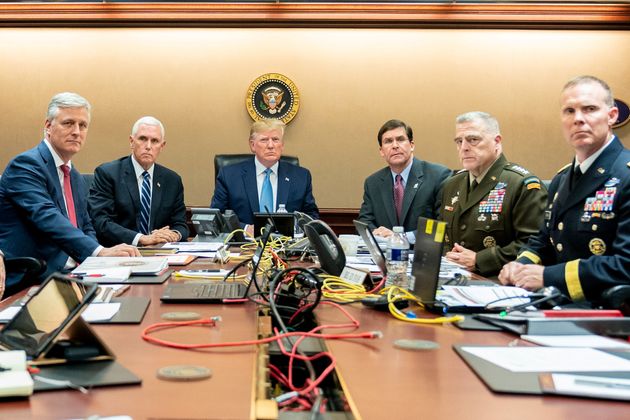Daesh leader’s death changes nothing

Donald Trump’s announcement that the Daesh leader was dead followed the same routine that his predecessor had followed in 2011 with the killing of the leader of Al-Qaeda, when he too was taken out by US Special Forces. President George W. Bush also said much the same after Abu Musab Al-Zarqawi was taken out in 2006. All three presidents used these operations for domestic and international political gain, to pose as successful leaders, even if the reality is that the operations were more the result of the sustained efforts of military and intelligence personnel, not political leaders.
Any sane, rational examination of the whole situation should give all of us pause for thought. None of us will lose sleep at the demise of such men, but plenty of sleep should be lost as to why, 18 years after the 9/11 attacks, the collective effort to deal with them is so pitiful and why so many of the same mistakes get repeated ad nauseam.
Here is a little exercise in crudely imagining just how the media and politicians could consider how to treat Daesh and the killing and capture of their leaders: “In a significant step forward in the struggle against international organized crime, a mass murderer and his violent thugs have been killed in a shootout with security forces in northwest Syria. The authorities released a statement stating that a number of gang members had been arrested and will face trial.”
I exaggerate for effect, not least because it may be unrealistic to imagine a trial taking place. But the fact that the US president is basking in the glory of killing the Daesh leader only adds to this criminal’s fame. Front pages are devoted to nothing else. Yet why do we even mention his name? To the extent that the Daesh leader was a symbol, it is because we helped make him one.
To crush the likes of Al-Qaeda and Daesh, we did not embark on a manhunt or a criminal investigation, we went to war against them. We had a “war on terror.” Like some hero in the Wild West, the Daesh leader even had a $25 million bounty on his head. Is it any wonder that every misfit and lunatic wanted to go off and join this enterprise? These thugs adore the publicity and the status of being labeled terrorists and the most wanted people on earth. It raises the question why do we not just refer to them as common criminals and mass murderers? What else are they?
Much of what Daesh has done over the years was designed solely for publicity; from lurid videos of beheadings and throwing people off buildings to the video of the Jordanian pilot being burned alive. The attention given to them only turbocharged their status and encouraged them to do more. Daesh also worked out that killing Westerners attracted far more attention than Arabs and Muslims, so saved their most spectacular and gory executions for their Western captives. The media saw no issue with circulating the photos of these events and often even the videos. Social media fanned the flames. Unwittingly, we have all collectively contributed to what such idiots were seeking to achieve — notoriety.
Many also played the Daesh game by depicting them as Muslims. More than anyone, Muslims will be delighted to see the back of this murderer, as so many Muslims have died and will continue to die at the hands of Daesh. But they are also painfully aware that the Syrian regime has killed many thousands more civilians over the last eight years and is now on the brink of resuming control of almost all of Syria.
By depicting this operation as a huge success, we miss the big picture. The criminal leader had actually been in US detention in Camp Bucca in Iraq together with nearly all of those who became his partners in crime. Here, their mafia-like network developed; contacts were made and skills shared. For Camp Bucca, now read Al-Hol in northeast Syria, where a similar process is taking place.
The fact that the US president is basking in the glory of his killing only adds to this criminal’s fame.
Chris Doyle
For six years or so, this Daesh leader had evaded capture and death. Much like the fictional Scarlet Pimpernel, “they sought him here, they sought him there, (they) seek him everywhere. Is he in heaven or is he in hell? That damned elusive Pimpernel.” Daesh committed atrocities and even captured entire cities such as Mosul and Raqqa, yet he could not be tracked down until now.
For most of October, the world had lamented the anti-Daesh strategy, with tons of criticism leveled at Trump for greenlighting the Turkish invasion of Syria, betraying the Kurdish allies who fought Daesh, and risking the group’s fighters escaping. In fact, about 100 did. From our new vantage point, these decisions may even have put the Idlib operation at severe risk. The killing of the Daesh leader changes nothing. The criticism is just as valid. New leaderships are emerging as succession planning is a feature of such groups. Morale will be crushed, but only in the short-term. The environment in both Syria and Iraq is, if anything, becoming even more fertile for such extremist groups, as none of the underlying issues that brought them into being in the first place have been resolved.
It is all too easy to foresee perhaps Trump or a successor, five or 10 years hence, huddled in the White House situation room, as President Barack Obama did before, watching some future operation to take out some fresh new “Enemy No. 1.” To avoid that undesirable scenario, it is time for a root and branch rethink, to press the reset button.
- Chris Doyle is director of the London-based Council for Arab-British Understanding. Twitter: @Doylech









































